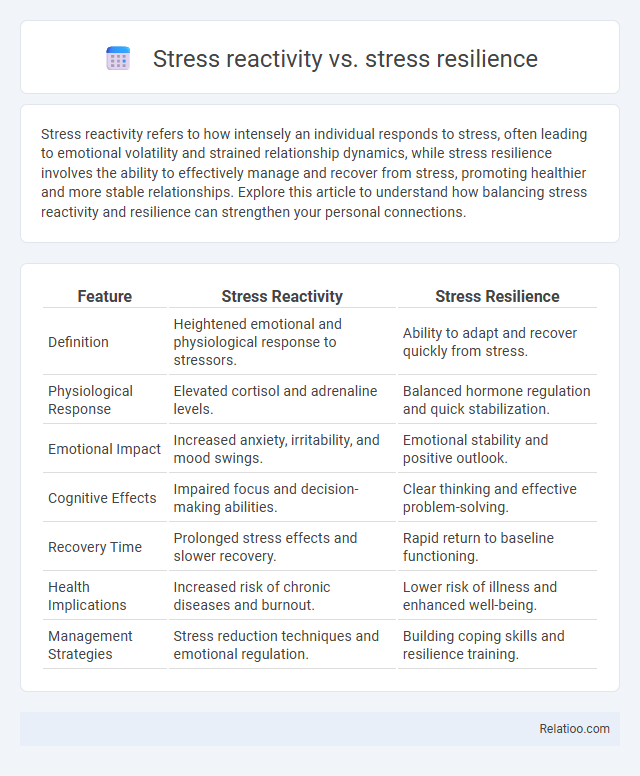Stress reactivity refers to how intensely an individual responds to stress, often leading to emotional volatility and strained relationship dynamics, while stress resilience involves the ability to effectively manage and recover from stress, promoting healthier and more stable relationships. Explore this article to understand how balancing stress reactivity and resilience can strengthen your personal connections.
Table of Comparison
| Feature | Stress Reactivity | Stress Resilience |
|---|---|---|
| Definition | Heightened emotional and physiological response to stressors. | Ability to adapt and recover quickly from stress. |
| Physiological Response | Elevated cortisol and adrenaline levels. | Balanced hormone regulation and quick stabilization. |
| Emotional Impact | Increased anxiety, irritability, and mood swings. | Emotional stability and positive outlook. |
| Cognitive Effects | Impaired focus and decision-making abilities. | Clear thinking and effective problem-solving. |
| Recovery Time | Prolonged stress effects and slower recovery. | Rapid return to baseline functioning. |
| Health Implications | Increased risk of chronic diseases and burnout. | Lower risk of illness and enhanced well-being. |
| Management Strategies | Stress reduction techniques and emotional regulation. | Building coping skills and resilience training. |
Understanding Stress: Reactivity vs Resilience
Stress reactivity refers to the intensity and duration of an individual's physiological and psychological response to stressors, often measured by cortisol levels, heart rate variability, and emotional reactions. Stress resilience, by contrast, denotes the ability to adapt, recover, and maintain mental well-being despite experiencing stress, influenced by factors such as genetic predisposition, social support, and coping strategies. Understanding the distinction between stress reactivity and resilience is crucial for developing targeted interventions that enhance adaptive capacity while minimizing harmful stress responses.
The Science Behind Stress Responses
Stress reactivity refers to the immediate physiological and psychological responses triggered by perceived threats, involving the activation of the hypothalamic-pituitary-adrenal (HPA) axis and sympathetic nervous system. Stress resilience, contrastingly, is the capacity to effectively adapt and recover from stressors, influenced by genetic, neurobiological factors, and environmental experiences that regulate cortisol levels and neural plasticity. Research highlights that individual variability in stress responses stems from differential gene expression, epigenetic modifications, and neural circuit functioning, crucial for understanding mental health disorders and developing targeted interventions.
Key Differences: Stress Reactivity and Stress Resilience
Stress reactivity refers to the physiological and psychological response magnitude to stressors, typically involving heightened cortisol release and increased heart rate variability. Stress resilience denotes the ability to adapt and recover swiftly from stress, often characterized by effective emotion regulation and robust neural connectivity in the prefrontal cortex. Key differences lie in stress reactivity reflecting immediate, often exaggerated responses to stress, while stress resilience emphasizes long-term adaptive capacity and recovery from stress exposure.
Biological Factors Influencing Stress Reactivity
Biological factors influencing stress reactivity include genetic predispositions, neuroendocrine system functioning, and neural circuitry involving the amygdala and prefrontal cortex. Cortisol regulation via the hypothalamic-pituitary-adrenal (HPA) axis plays a crucial role in determining individual differences in stress responses. Variations in neurotransmitter systems such as serotonin and dopamine also modulate stress reactivity and resilience levels.
Psychological Traits of Stress-Resilient Individuals
Stress-resilient individuals exhibit psychological traits such as emotional regulation, cognitive flexibility, and a positive outlook, which enable them to manage stress effectively and recover quickly from adversity. Their stress reactivity is characterized by a balanced physiological and emotional response, preventing overwhelming feelings and maintaining mental stability. Understanding Your psychological traits related to stress resilience can enhance coping strategies and improve overall well-being during challenging situations.
Environmental Impact on Stress Response
Environmental factors significantly influence your stress reactivity and stress resilience by shaping how your body and mind respond to stressors. High exposure to chronic environmental stressors such as noise pollution, urban crowding, or unstable social settings can increase stress reactivity, leading to heightened cortisol levels and impaired immune function. Conversely, supportive environments with access to nature, social support, and restorative experiences bolster stress resilience, promoting adaptive coping mechanisms and reducing physiological stress responses.
Measuring Stress Reactivity and Resilience
Measuring stress reactivity involves assessing physiological indicators such as cortisol levels, heart rate variability, and galvanic skin response during exposure to acute stressors, providing insight into the body's immediate response to stress. Stress resilience measurement focuses on evaluating an individual's capacity to maintain or quickly regain psychological and physiological equilibrium using self-report scales like the Connor-Davidson Resilience Scale (CD-RISC) and monitoring long-term recovery patterns. Quantitative analysis of stress reactivity and resilience combines biomarker data with psychological assessments to differentiate between transient stress reactions and adaptive coping mechanisms.
Health Consequences: Chronic Reactivity vs Resilient Adaptation
Chronic stress reactivity leads to prolonged activation of the hypothalamic-pituitary-adrenal (HPA) axis, increasing the risk of cardiovascular disease, impaired immune function, and mental health disorders such as depression and anxiety. In contrast, stress resilience is characterized by adaptive physiological responses that promote quicker recovery and homeostasis, reducing the incidence of stress-related diseases. Individuals with high stress resilience exhibit lower allostatic load and enhanced neural plasticity, supporting long-term health and well-being.
Strategies to Reduce Stress Reactivity
Stress reactivity refers to how strongly your body and mind respond to stressors, while stress resilience is your ability to recover and maintain function despite stress. Effective strategies to reduce stress reactivity include mindfulness meditation, regular physical exercise, and cognitive-behavioral techniques that help reframe negative thought patterns. Implementing these methods can enhance your stress resilience by lowering physiological arousal and promoting adaptive responses to stressful situations.
Building Lifelong Stress Resilience
Stress reactivity refers to how intensely your body and mind respond to stressors, often triggering fight-or-flight reactions, while stress resilience denotes your ability to adapt and recover from these challenges effectively. Building lifelong stress resilience involves developing coping strategies, such as mindfulness, physical exercise, and social support, which enhance your capacity to manage stress without excessive physiological or emotional disruption. Understanding the distinction between reactivity and resilience empowers you to strengthen your responses, promoting long-term mental and physical well-being.

Infographic: Stress Reactivity vs Stress Resilience
 relatioo.com
relatioo.com